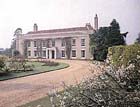Budget relief for non-doms
Alastair Darling has let non-doms off in his first Budget, as well as helping key workers buy property, but keeping stamp duty thresholds the same


The Chancellor Alastair Darling presented his first Budget to Parliament today. He said there are plans to charge people registered as non-domiciled for tax purposes a fee of £30,000 when they have lived in the UK for seven years but want to keep non-dom status. It is right and fair they pay proper taxes, Darling said, although he stated that the continued taxation of overseas wealth will be on a remittance basis. According to Savills, in theory the £30,000 levy should not cause a major problem given that it only applies to those long term resident in the UK, and according to Customs and Revenue should be offsettable against overseas tax liabilities and is only relevant to those with sizeable overseas incomes. 'The extremely wealthy are unlikely to baulk at the scale of the charge, and so the major concern has been amongst the brokers, bankers and hedge fund managers. If these individuals shorten their stay in the UK because of the changes, then we expect the demand for rented accommodation to rise. Fundamentally a shift in demand for prime housing is unlikely unless employers move their operations lock, stock and barrel out of the UK' said Lucian Cook Director of Residential research. Mr Darling also announced that key workers such as teachers will be able to borrow money from shared-ownership schemes including those able only to afford half the price of the property. He also announced that stamp duty will not be required to be paid until buyers own 80% of the equity. No other changes were made to stamp duty thresholds. The Chancellor also said he will reduce VAT on the renovation and repair of buildings as soon as possible, which was welcomed by the Royal Institute of Chartered Surveyors: 'It is essential that VAT is lowered from 17.5% to 5% on the renovation and repair of buildings as soon as possible,' said James Rowlands from RICS. 'The current rate of VAT acts as serious block to the reuse of empty property and makes it overly expensive to improve outdated facilities such as bathrooms and kitchens. RICS has been calling for this change for several years as an effective tool to boost the number of properties being brought back into use.' In terms of planning, Mr Darling said sites have been identified to build 70,000 more new homes by 2020, on top of 40,000 new homes already planned by that date.
Exquisite houses, the beauty of Nature, and how to get the most from your life, straight to your inbox.
